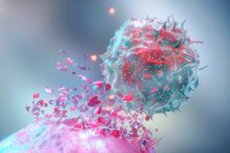New publications
Cell therapy used for cancer begins testing against autoimmune diseases
Last reviewed: 27.07.2025

All iLive content is medically reviewed or fact checked to ensure as much factual accuracy as possible.
We have strict sourcing guidelines and only link to reputable media sites, academic research institutions and, whenever possible, medically peer reviewed studies. Note that the numbers in parentheses ([1], [2], etc.) are clickable links to these studies.
If you feel that any of our content is inaccurate, out-of-date, or otherwise questionable, please select it and press Ctrl + Enter.

Sylvester Comprehensive Cancer Center, part of the University of Miami Miller School of Medicine, has joined 40 other centers in the U.S. and Europe as a participant in one of the country's first clinical trials of cell therapy for autoimmune diseases.
Although CAR T cell therapy was developed to treat patients with B-cell lymphomas, researchers soon realized that it could have applications beyond oncology.
“The way I see it, we’re at the intersection of cancer therapy and the treatment of other serious diseases,” said Damian Green, MD, the Ron and Nedra Kalish Family Chair in Stem Cell Transplantation, professor of medicine and chief of transplantation and cellular therapy at Sylvester.
"We've seen leaps and bounds in cancer and cell therapy. We're at one of those points now where we're seeing really dramatic results. Translating that knowledge into autoimmune disease treatment is a huge opportunity to help other patients facing serious, life-threatening conditions."
Common ground - B cells
Although lymphoma and autoimmune diseases are different in nature, they have one thing in common: B cells.
These immune cells become malignant in many types of lymphoma. But they are also “antibody factories” — and can produce antibodies that attack the body’s own tissues in autoimmune diseases.
Researchers have begun testing CAR T therapy in small groups of patients with chronic autoimmune diseases. The results have been striking: After the therapy kills B cells, new B cells come back healthy, without the self-targeting antibodies that are characteristic of autoimmune diseases.
Scientists call this an “immunological reset.” If confirmed in further trials, it could mean that a single dose of cell therapy could cure autoimmune diseases. What’s more, B-cell regeneration occurs more quickly in autoimmune patients than in cancer patients.
Innovative clinical research
The CAR T therapy used in this study targets the CD19 protein, which is located on the surface of B cells.
In this therapy, the patient's immune cells are genetically modified so that they can recognize and destroy abnormal cells. In the case of B-cell lymphomas, both malignant and healthy B cells are killed. But the healthy B cells eventually regenerate, in many cases with no sign of cancer recurrence.
The study is recruiting patients with:
- systemic lupus erythematosus;
- systemic sclerosis (scleroderma) - an autoimmune disease that causes scarring and thickening of the skin;
- polymyositis, an autoimmune disease that causes muscle weakness.
The first patient with an autoimmune disease recently received a CAR T infusion at Sylvester. A second patient with scleroderma will be treated soon.
The first CAR T infusion for an autoimmune patient reminded Dr. Lazaros Lekakis, professor of transplantation and cell therapy, of the day his team first treated a cancer patient with cell therapy.
Both patients (with scleroderma and lymphoma) experienced neurological side effects from the T cells. Such effects are now known to be common and treatable.
“Ten years ago, we didn’t know what we were looking at,” said Dr. Lekakis, a clinical professor who led the Sylvester trial. “Now we know what to do.”
The scleroderma patient recovered quickly from the side effects and was recently discharged from the hospital.
Why Oncologists Are Leaders in Treating Autoimmune Diseases
“It’s stories like these that show why oncologists and specialized staff in the transplant and cell therapy department are leading the charge,” said Dr. Green. “These physicians have vast experience in treating cell therapies and managing their side effects.”
"The people who can do this are here at Sylvester. We know how to deal with side effects and toxicity. We know how to manage these drugs, and that's quite complex."
Next steps
Sylvester’s center will soon be involved in a second clinical trial of CAR T therapy designed exclusively for lupus patients. Dr. Lekakis and his colleagues are also in discussions with neurologists at the Miller School of Medicine about trials to treat autoimmune neurological diseases such as multiple sclerosis.
Volunteers' Impact Goes Beyond Oncology
The expansion of cell therapy to diseases beyond cancer highlights not only the innovation of researchers and doctors, but also the generosity of cancer patients, Dr. Green said. The success of CAR T therapy was made possible by patients who volunteered for early clinical trials despite uncertainty about its effectiveness.
“When we tell patients, ‘We don’t know if this will help you,’ the response I most often hear is, ‘I understand, but maybe it will help the next person,’” Dr. Green said. “They’re usually talking about the next person with the same diagnosis. But it turns out they’re helping a much broader group of people.”
